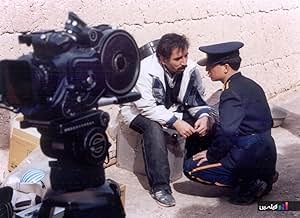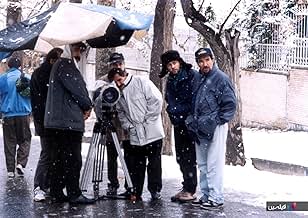ÉVALUATION IMDb
7,7/10
4,8 k
MA NOTE
Ajouter une intrigue dans votre langueAn Iranian policeman asks a director to make a film about a true stabbing incident involving both of them.An Iranian policeman asks a director to make a film about a true stabbing incident involving both of them.An Iranian policeman asks a director to make a film about a true stabbing incident involving both of them.
- Prix
- 1 victoire et 1 nomination au total
Avis en vedette
A self-reflexive semi-autobiographical account that finds writer-director Mohsen Makhmalbaf trying to reconstruct a childhood incident from memory, A Moment of Innocence is an attempt by him to make amends with a former policeman who was at the receiving end of this very episode back in their youth.
An interesting dramatisation of the real-life event that cleverly merges past with present and fiction with reality, the film attempts to recreate the said event from the perspective of both the director & the policeman. But it's the new revelations that emerge from the whole re-enactment that makes the journey so fascinating.
Shot in documentary style, the film follows the policeman & director recounting the event and providing background details of their younger selves to the novice actors who are supposed to play them on camera. The boys' hesitation to act out the scenes is evident but it's the final frame that brings home the film's message with clarity.
Overall, A Moment of Innocence is a fusion of art & life that expertly showcases the power of cinema & its ability to heal wounds of the past. Through this docu-fiction, Mohsen Makhmalbaf speaks to the innate decency in all of us and offers an arresting reflection of youth, love, loss, guilt, regret, innocence & forgiveness. Definitely worth a shot.
An interesting dramatisation of the real-life event that cleverly merges past with present and fiction with reality, the film attempts to recreate the said event from the perspective of both the director & the policeman. But it's the new revelations that emerge from the whole re-enactment that makes the journey so fascinating.
Shot in documentary style, the film follows the policeman & director recounting the event and providing background details of their younger selves to the novice actors who are supposed to play them on camera. The boys' hesitation to act out the scenes is evident but it's the final frame that brings home the film's message with clarity.
Overall, A Moment of Innocence is a fusion of art & life that expertly showcases the power of cinema & its ability to heal wounds of the past. Through this docu-fiction, Mohsen Makhmalbaf speaks to the innate decency in all of us and offers an arresting reflection of youth, love, loss, guilt, regret, innocence & forgiveness. Definitely worth a shot.
10amir-22
This is the greatest among the dozen or so Makhmalbaf titles I have seen. I was stunned that a movie so thematically complex (politics, history, redemption, etc.) can be conveyed with a superb lightness of touch. When you watch it, you really feel like you're watching a comedy. Only gradually does the movie reveal its many layers, culminating in a final freeze-frame that might be the BEST in all of cinema. More people should watch this movie! (It's certainly a lot more fun than anything by Abbas Kiarostami - a man who is more of a moral philosopher than a film-maker per se).
There is absolutely nothing bad I can say about this film. I was lucky enough to attend a screening of this gem last night at the Alamo Drafthouse. The show was nearly sold out, for good reason.
This film is about a real life experience that Mohsen Makhmalbaf had at the age of seventeen. When he was seventeen, he stabbed a police man while participating in a demonstration. He was imprisoned for five years. Twenty years after this event took place, he has made amends with the policeman he stabbed and is now making a film about this incident.
The film is a work of art. It is beautifully shot, with no over the top camera work and editing. The film is masterfully directed and it is very humanistic. This film will probably prove to be one if the most important films in the history of cinema, especially to Iranian filmmakers. I would recommend this film to any and everybody.
This film is about a real life experience that Mohsen Makhmalbaf had at the age of seventeen. When he was seventeen, he stabbed a police man while participating in a demonstration. He was imprisoned for five years. Twenty years after this event took place, he has made amends with the policeman he stabbed and is now making a film about this incident.
The film is a work of art. It is beautifully shot, with no over the top camera work and editing. The film is masterfully directed and it is very humanistic. This film will probably prove to be one if the most important films in the history of cinema, especially to Iranian filmmakers. I would recommend this film to any and everybody.
It is true that from a purely technical perspective, the freeze frame at the end of this film is quite revolutionary. A lot of viewers have expressed some positive comments about it. Hence, it would not be an understatement to call it one of the best moments in the history of cinema. However, Iranian director Mohsen Makhmalbaf goes much more beyond this accomplishment as 'A moment of innocence' attempts to recreate an important event of the past in present times for future generations using existential themes and film making process. As a young man, while protesting against Shah's regime, director Mohsen Makhmalbaf had stabbed a police man. Although he chose an autobiographical episode which occurred many years ago, there has been no attempt made by Makhmalbaf to glorify neither violence nor revolutionary ideology. It appears as if everybody has become more compassionate including the young actor chosen to represent Makhmalbaf. This pacifist strategy brings everybody connected to the film to the conclusion that violence is no solution if the world needs to be changed. It is only through love can somebody aspire to change the world.
The Iranian cinema is perhaps the most self-reflexive of all national cinemas. Though it owes much to the development of Italian neo-realism, the Iranian cinema today is not just an extension of its predecessor's concerns about cinematic truth but a formal inquiry of the nature of cinema and the "truth" that lies within and outside of art. Jacques Rivette's groundbreaking "L'amour fou" already sets the stage in 1968 when he investigated the symbiotic relationship betwen art and life by using two different film stocks, 16 and 35 mm., to represent "reality" as it unfolds in front and behind the camera respectively.
In Moshen Makhmalbaf's 1996 masterpiece "A Moment of Innocence" twenty years separates a key moment in time and the recreation of it. The incident occurred when Makhmalbaf was only a youth who participated in an anti-Shah demonstration which led to the stabbing of a policeman and his imprisonment for the next five years. In an attempt to recapture this moment Makhmalbaf decides to a make a film within a film casting all the original participants (including the policeman) to play themselves as mentors to their younger selves, (i.e., actors) guiding and instructing them in the making of this "fictional" documentary.
It is not surprising that non-professional actors are employed here to both maintain a semblance of reality and to keep cinematic distortion at bay. But paradoxically, the young non-professional actors chosen to play Makhmalbaf and the policeman of their youth are as similar as they are dissimilar from their counterparts, thus, setting the stage for exploring the many tensions that exist between past and present, art and life, cinema and reality. This type of casting not only blurs the line between fiction and reality but also the distinction between documentary and narrative filmmaking.
The preoccupation with the phenomenological aspects of the cinema is as much the focus of this work as is the dramatization of the event leading up to the pivotal moment, then and now, reconstructed as a memory film as well as a product of the filmmaker's imagination to help correct an incident that only becomes clear to everyone involved after twenty years have elapsed. This celebrated moment which occurs at the end of film effectively captures the past by placing it in the present context much as if past and present suddenly converge and share the same space and time, thereby allowing us to see loss and recovery unfold simultaneously. That lost moment is now regained twenty years later through art's ability to heal and transform Makhmalbaf and his crew--thus altering the "reality" of life. The final shot is both life-affirming and referential because it so eloquently evokes the cinema's first prominent use of the freeze frame in Truffaut's "400 Blows"--if only to remind us just how far the cinema has come along. Like Truffaut's autobiographical based character Antoine Doinel the cinema has indeed grown up.
In Moshen Makhmalbaf's 1996 masterpiece "A Moment of Innocence" twenty years separates a key moment in time and the recreation of it. The incident occurred when Makhmalbaf was only a youth who participated in an anti-Shah demonstration which led to the stabbing of a policeman and his imprisonment for the next five years. In an attempt to recapture this moment Makhmalbaf decides to a make a film within a film casting all the original participants (including the policeman) to play themselves as mentors to their younger selves, (i.e., actors) guiding and instructing them in the making of this "fictional" documentary.
It is not surprising that non-professional actors are employed here to both maintain a semblance of reality and to keep cinematic distortion at bay. But paradoxically, the young non-professional actors chosen to play Makhmalbaf and the policeman of their youth are as similar as they are dissimilar from their counterparts, thus, setting the stage for exploring the many tensions that exist between past and present, art and life, cinema and reality. This type of casting not only blurs the line between fiction and reality but also the distinction between documentary and narrative filmmaking.
The preoccupation with the phenomenological aspects of the cinema is as much the focus of this work as is the dramatization of the event leading up to the pivotal moment, then and now, reconstructed as a memory film as well as a product of the filmmaker's imagination to help correct an incident that only becomes clear to everyone involved after twenty years have elapsed. This celebrated moment which occurs at the end of film effectively captures the past by placing it in the present context much as if past and present suddenly converge and share the same space and time, thereby allowing us to see loss and recovery unfold simultaneously. That lost moment is now regained twenty years later through art's ability to heal and transform Makhmalbaf and his crew--thus altering the "reality" of life. The final shot is both life-affirming and referential because it so eloquently evokes the cinema's first prominent use of the freeze frame in Truffaut's "400 Blows"--if only to remind us just how far the cinema has come along. Like Truffaut's autobiographical based character Antoine Doinel the cinema has indeed grown up.
Le saviez-vous
- AnecdotesThis film is in the Official Top 250 Narrative Feature Films on Letterboxd.
Meilleurs choix
Connectez-vous pour évaluer et surveiller les recommandations personnalisées
- How long is A Moment of Innocence?Propulsé par Alexa
Détails
Box-office
- Brut – États-Unis et Canada
- 37 598 $ US
- Fin de semaine d'ouverture – États-Unis et Canada
- 3 997 $ US
- 14 nov. 1999
- Durée1 heure 18 minutes
- Couleur
- Rapport de forme
- 1.85 : 1
Contribuer à cette page
Suggérer une modification ou ajouter du contenu manquant























